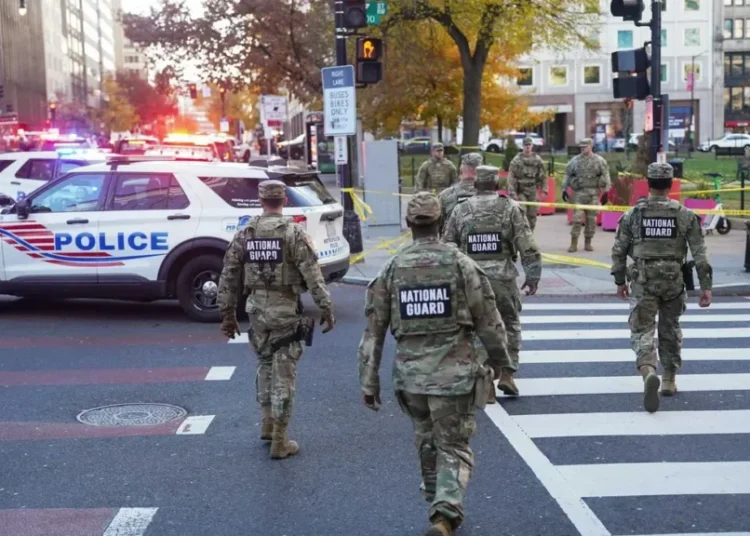In the event of a sudden pandemic, what should we do? This month, Jay Bhattacharya, the director of the National Institutes of Health, offered a remarkably blunt answer: nothing.
It’s been nearly six years now since the United States’ first reported cases of Covid-19, and the country is in a merciful lull when it comes to pandemic recriminations, as Robert F. Kennedy Jr.’s ongoing war on vaccine confidence now dominates the public health culture wars. But Bhattacharya, writing with his deputy Matthew Memoli in City Journal, returns with a bill of Covid complaints, arguing that to prepare for a future infectious disease threat, the country should toss out the longstanding “pandemic playbook” and focus instead on making the population “metabolically healthy” — what you might think of as just fit.
Forget social distancing, in other words; forget masks and forget even a next-generation equivalent of Operation Warp Speed to deliver a next-generation equivalent of miraculous Covid vaccines, which saved millions of American lives and tens of millions of lives abroad. The best way to fight off a novel infectious disease, Bhattacharya and Memoli write, is to get the country into better physical shape before the emergency arrives and bet that our fitter bodies would be capable of simply fending it off, whatever the pathogen, however quickly it might spread and however deadly it might be.
Perhaps this sounds half reasonable since, theoretically, a healthier population should fare better facing any health threat. Or perhaps it sounds like eugenics, since it suggests that we should think of infectious disease as a kind of fitness test for the country — and should worry more about getting Americans to pass that test rather than protecting those who can’t. How exactly might we go about doing that? “By stopping smoking, controlling hypertension or diabetes, or getting up and walking more,” Bhattacharya and Memoli write.
This is all fine as generic health advice, of course. But 38 million Americans have diabetes. More than 100 million have heart disease. More than 100 million are obese. Massively improve those numbers and there will still be tens of millions staring down a novel pathogen in ill health. And as a program of pandemic response? Like much of MAHA, it is magical thinking that has the secondary effect of laying responsibility for public health outcomes at the feet of the individual. Imagine sitting in the National Institutes of Health, contemplating the arrival of a disease like H.I.V./AIDS, which has killed 700,000 Americans, and advising the country that, as Bhattacharya and Memoli write, “the best pandemic preparedness playbook for the United States is making America healthy again.”
Or, for that matter, take Covid-19, which many contrarians will now tell you killed only the sick and vulnerable. The claim is flattering to survivors but otherwise deeply misleading: Poor health mattered for individuals and at the population level, but it was hardly determinative on its own. Age, which of course one cannot change, was the overwhelmingly dominant factor. Anything you might have done to improve your health before the pandemic arrived would have proved trivial compared with how old you were — and the fact that SARS-CoV-2 was a rapaciously infectious novel pathogen spreading through an immuno-naïve world.
The C.D.C. synthesizes research on this question this way: Obesity and diabetes with complications both increased the risk of death from Covid-19 by about 30 percent; chronic kidney disease, C.O.P.D. and bronchiectasis and neurocognitive disorders added 20 percent; heart disease added about 10 percent. These were the common conditions with the largest impact on individual mortality risk, and though each would make a meaningful difference in any individual case, the effect was only as large as a couple of years of age. You’d rather have been thin than obese in 2020, but you’d rather have been an obese 40-year-old than a fit 50-year-old. What does that tell you about the pandemic value of good health?
Future pandemics won’t likely resemble the last one, which is one reason it may be somewhat counterproductive to relitigate 2020 and 2021: Are we sure we want to resolve anything in particular about school policies without knowing the age skew of a future disease, for instance, or anything about social distancing before knowing how infectious it might be? Do we really want to give a second look to the old miasma theory or consider a variant called terrain theory, simply out of frustration with 2020 and 2021? One credible, though by no means definitive, account by Christopher Ruhm suggested that between the most and the least restrictive states, mitigation strategies could explain as many as 447,000 deaths in the first two years of the Covid pandemic. Are we really prepared to embrace a D.I.Y. public health libertarianism in the wake of a respiratory pandemic that taught us — or should have — that whenever we share air, we share disease?
To a distressing degree, the answer appears to be yes — not just in the fiercest MAHA circles but among the country at large, as a poll shows.
The poll, published in The Argument with the headline “The Covid Political Backlash Disappeared,” showed that respondents largely supported mitigation policies, at least in retrospect. Many of its findings will not surprise regular readers of this newsletter: that despite conventional wisdom about public health resentment and liberal overreach, mitigation policies do not appear to have disproportionately cost the Democrats, who were graded more positively than Republicans in their handling of the pandemic and rated more highly on matters of personal health; that despite criticism about school closures so pervasive that national Democrats now reflexively apologize for them, in fact, those closures are still seen by most as having been largely necessary at the time; and although the pandemic experience damaged confidence in vaccines, when it comes to routine shots, the country remains pretty anti-anti-vaccine, with 77 percent of respondents telling The Argument’s pollsters they’d advise friends to follow the standard vaccination schedule and only 15 percent saying they’d advise against it.
But however much sympathy Americans may have for the panic of 2020, they don’t seem exactly eager to go through it all again — this is, for me, the signal finding of the poll. Only 54 percent of respondents said they would like to see the government invest in the development of vaccines. Only half said that they’d support restrictions on large indoor gatherings in the event of a similar pandemic, and even fewer said they’d support mask mandates, restrictions on indoor dining, vaccine mandates or school closures.
That last one illustrates the pattern very neatly. The poll tells us that Americans believed school closures were necessary by a nearly 20-point margin. It also tells us that Americans would oppose closing them again under similar pandemic circumstances, also by a roughly 20-point margin.
There are several ways of interpreting this paradox. But probably the most important question about the new consensus is: How long will it hold? The answer may be simply as long as the memory of the pandemic experience lasts.
Perhaps this strikes you as counterintuitive. Over the last few years, commentators have explained a whole lot of distressing social phenomena — from the resurgence of right-wing authoritarianism and antisemitism to the return of land war in Europe and total war in the Middle East, and indeed to the renewed prospect of nuclear war — in part by highlighting the way that cautionary memories of those risks have died out with members of previous generations burdened by direct experience. Early in the Covid emergency, you might’ve said the same about pandemic preparedness, that the wealthy world had been spoiled into complacency by decades of relatively good fortune and that, should a future pandemic arrive shortly on the heels of this one, the response the second time around would be more pre-emptive and robust. As time wore on, the main lesson the country as a whole seems to have drawn from our experience with Covid is simply that we hated it.
The post When the Next Pandemic Comes, MAHA Says, You’re on Your Own appeared first on New York Times.




